The Black slaves of colonial America brought their own culture from Africa to
the new land. Despite their persecution, the "slave culture" has contributed
greatly to the development of America's own music, dance, art, and clothing.
Music
It is understandable that when Africans were torn from their homes and families,
lashed into submission , and forced into lifelong slave labor, they would be, on
the most part, resentful and angry. Various forms of expression, clandestine
yet lucent, developed out of these feelings. One such form was music. Native
African music consisted mainly of wind and string melodies punctuated by hand
clapping, xylophones, and drum beats. Along those lines, an early type of
slave music was the spiritual, which has its roots in Protestant hymns taught to
the slaves. Spirituals were "long thought to be the spontaneous creation of
African-American slaves and the only original folk music of the U.S."
Spirituals told tales of suffering and struggle, but these true meanings were
often hidden.
An example is in the song "Gospel Train" with the lyrics, "Get on
board, little children/There's room for many a-more/The gospel train's a-leavin'
..." The "gospel train" of the song likely represented an escape method, such
as the Underground Railroad. Another type of music distinct to African slaves
was gospel. These songs originated in plantation fields as work songs, and were
later sung in churches of Black congregations. They were intended to enliven a
crowd, and employed bright music and joyful lyrics. Gospel music contributed to
the development of musical genres historically considered "white", such as rock'
n'roll and country and western.
Religion
Before Blacks came to America, they had their own highly developed
religious beliefs. Most cultures believed in one almighty God, and the ideas of
good and evil. They also practiced "ancestor worship", believing that...


